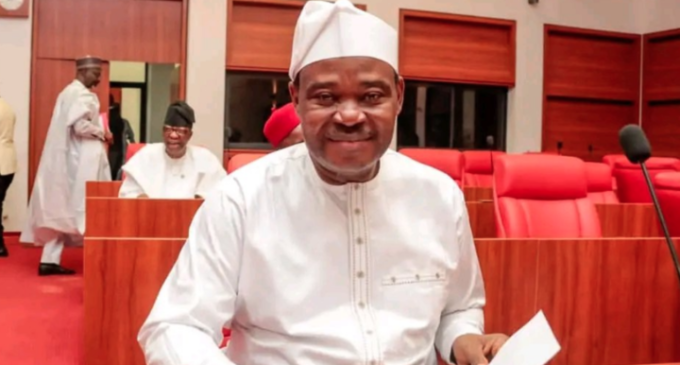Jimoh Ibrahim, a senator representing Ondo South, claimed former President Muhammadu Buhari did not build airports and railways during his administration.
Ibrahim claimed that the airports and railways commissioned during Buhari’s administration were built by Goodluck Jonathan, Buhari’s predecessor.
Speaking on Channel Television’s Politics Today, the businessman said the country’s economic variables went “negative” under Buhari.
“Two years after Buhari came in, it became negative to $17 billion. Each of the variables went negative in Buhari’s administration. Things went wrong,” Ibrahim had said.
All these rails and airports were built by Jonathan. You can’t even pinpoint one single project that cost $1 billion that Buhari actually funded.”
CLAIM: BUHARI DID NOT BUILD AIRPORTS AND RAILS; JONATHAN DID
VERIFYING THE CLAIM
In September 2021, Femi Adesina, former special adviser to Buhari on media and publicity, listed some “giant-sized jinxes” broken by the administration of Buhari.
Adesina listed the Itakpe-Warri rail line, Abuja-Kaduna rail line, Abuja metro line, and Lagos-Ibadan rail line as the railway projects completed while Buhari was president.
The completion of the aforementioned rail lines elicited varied reactions about the administration that initiated the projects, especially the Abuja-Kaduna rail line.
FACTS ABOUT THE ABUJA-KADUNA RAIL LINE
The Abuja-Kaduna rail line project was conceived by former President Olusegun Obasanjo, who served the country between 1999 and 2007. The contract for the project was awarded to China Civil Engineering Construction Corporation Ltd (CCECC), for the sum of $8.3 billion, to be funded by a loan from China.
The Abuja-Kaduna rail line was initially proposed as part of the Lagos-Kano standard gauge modernisation project, but funding challenges limited the scope. During the administration of late former President Umaru Musa Yar’Adua, the project was halted due to funding challenges.
The Abuja-Kaduna rail line construction commenced in February 2011 and concluded in December 2014. Jonathan served as acting president from February to May 2010 and as president from May 2010 to May 2015.
The Abuja-Kaduna segment is the inaugural phase of the Lagos-Kano standard gauge project within Nigeria’s first standard gauge railway modernization projects (SGRMP).
PROCUREMENT OF LOCOMOTIVES FOR ABUJA-KADUNA RAIL PROJECT
In October 2014, the federal executive council (FEC) approved $6.6 million for the procurement of two locomotives for the Abuja-Kaduna rail. Jonathan handed over power to Buhari on May 29, 2015 and the latter completed the project.
BUHARI LAUNCHED ABUJA-KADUNA RAILWAY
On July 26, 2016, Buhari launched the Abuja-Kaduna standard-gauge railway line at the Idu station in Abuja. During the launch, Buhari expressed his willingness to complete other projects passed down by the Jonathan administration.
OTHER RAIL PROJECTS
The 157km Lagos-Ibadan rail line project was one of the railways in the country commissioned by the Buhari-led administration. But which administration started or initiated it?
The first train ride from Lagos to Ibadan was dated back to the early 1900s, during the regime of the British colonial government. The Lagos to Ibadan train route was one of the rail lines constructed by colonialists and taken over by the indigenous government.
Some years after Nigeria’s independence, passengers still enjoyed the trains provided by the colonial government. However, by 2003, the rail lines had been destroyed. Jonathan’s administration made efforts to revive the Lagos-Ibadan rail lines.
In June 2012, during Jonathan’s administration, the federal executive council approved a $1.49 billion contract for the modernisation of the Lagos-Ibadan rail project.
The Chinese construction firm — CCECC — got the contract.
Two months later, the federal government signed a memorandum of understanding with CCECC for the construction of the project.
Idris Umar, the then minister of transport, said the contract signified the continued commitment to the federal government’s policy to the modernisation of the railway system in the country. Umar said the contract was expected to last for 36 months and partly financed by the Chinese government through the China Exim Bank concessionary loan facility.
The project did not start under Jonathan, but in 2016, after the Buhari-led administration renegotiated the contract with the Chinese company.
UNDER BUHARI COUNTERPART FUNDING WAS RELEASED FOR LAGOS-IBADAN RAILWAY
In January 2017, the federal government disclosed that it had released N72 billion as the full counterpart funding for the construction of the Lagos-Ibadan modernization railway project.
In March 2017, former Vice-President Yemi Osinbajo flagged off the Lagos-Ibadan rail project. Four years later, Buhari commissioned the Lagos-Ibadan standard gauge railway for commercial operations at the Mobolaji Johnson railway station, Ebute Metta, Lagos.
ITAKPE-WARRI RAIL LINE
In September 2020, Buhari inaugurated the 326-kilometer Itakpe-Ajaokuta-Warri rail line.
The project, which began in 1987 under the military administration of Ibrahim Babangida, was built to move iron ore from mines around Itakpe to the steelworks at Ajaokuta.
The project was abandoned after about 254 kilometres had been constructed due to a paucity of funds. It was resuscitated by the Jonathan administration but completed under Buhari.
In November 2009, the federal government approved the payment of N33 billion for the design and completion of the project. Team Nigeria and Julius Berger were awarded the project, with an anticipated delivery date in 2013.
The project was not completed before the change in government in 2015. In 2017, the federal government led by Buhari announced the move to revive the project, and the contract was awarded to Julius Berger – who later opted out of the contract.
In 2019, the Buhari administration signed a $3.9bn contract with the China Railway Construction Corporation Limited for the construction of a new rail line which would connect Abuja, Itakpe, and Lokoja.
The rail line was finally completed and commenced operations during the administration of Buhari after decades of neglect.
AIRPORTS
During the administration of Jonathan, the federal government executed some projects which included the rebuilding and remodelling of some airports in the country. Jonathan’s administration executed some projects to improve service delivery in the aviation sector, especially the construction of new terminals.
In September 2012, the federal government under Jonathan approved the sum of N106 billion for the construction of 11 new international airport terminal buildings in Nigeria.
In May 2013, Jonathan commissioned the remodelled Akanu Ibiam International Airport, Enugu, and laid the foundation stone for the new international terminal building at the airport.
In July 2013, the federal government inked a $500 million loan deal with China to build international airport terminals in Abuja, Lagos, Port Harcourt, and Kano. The Nigerian government was slated to contribute $100 million as counterpart funding.
Although the construction activities started during Jonathan’s administration, none of the airport projects were completed during his tenure.
Jonathan’s administration laid the foundation for the construction of new airport terminals across the country. When Buhari assumed office in 2015, he continued some of the projects initiated by the previous government in the aviation sector.
In October 2018, Buhari commissioned a new terminal at the Port Harcourt Airport, Port Harcourt, Rivers state.
In December 2018, Buhari commissioned a new terminal building at the Nnamdi Azikiwe International Airport, Abuja.
In March 2022, Buhari commissioned a new terminal at the Murtala Muhammed International Airport, Lagos.
VERDICT
It is misleading to say Buhari did not build airports and rails. Since government is a continuum, Buhari can take credit for completing some of these projects that were either abandoned or uncompleted by previous administrations.





